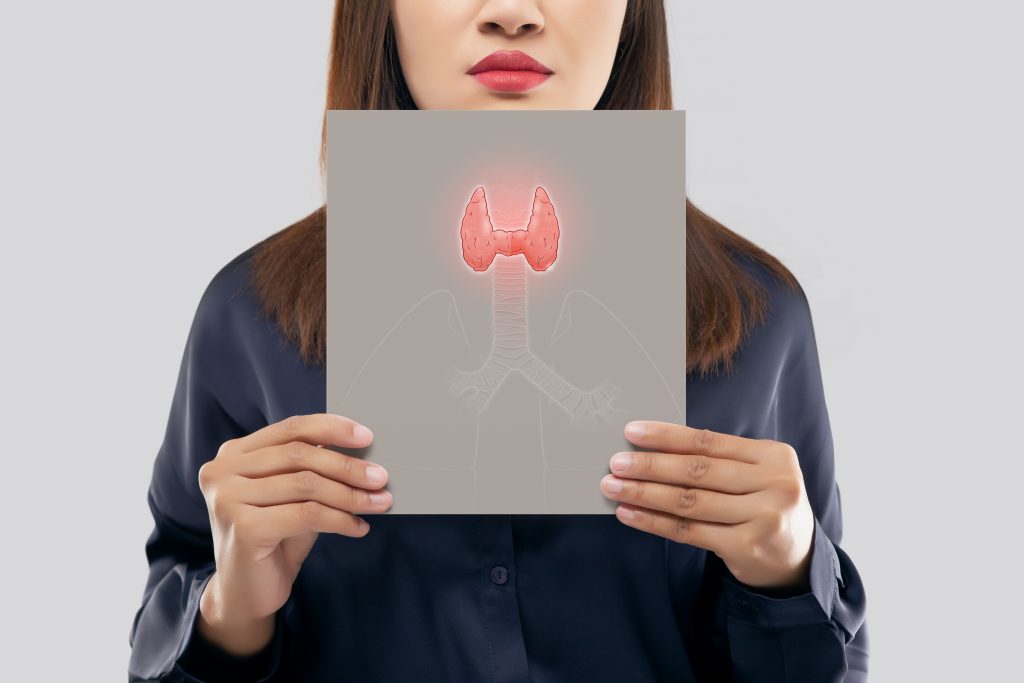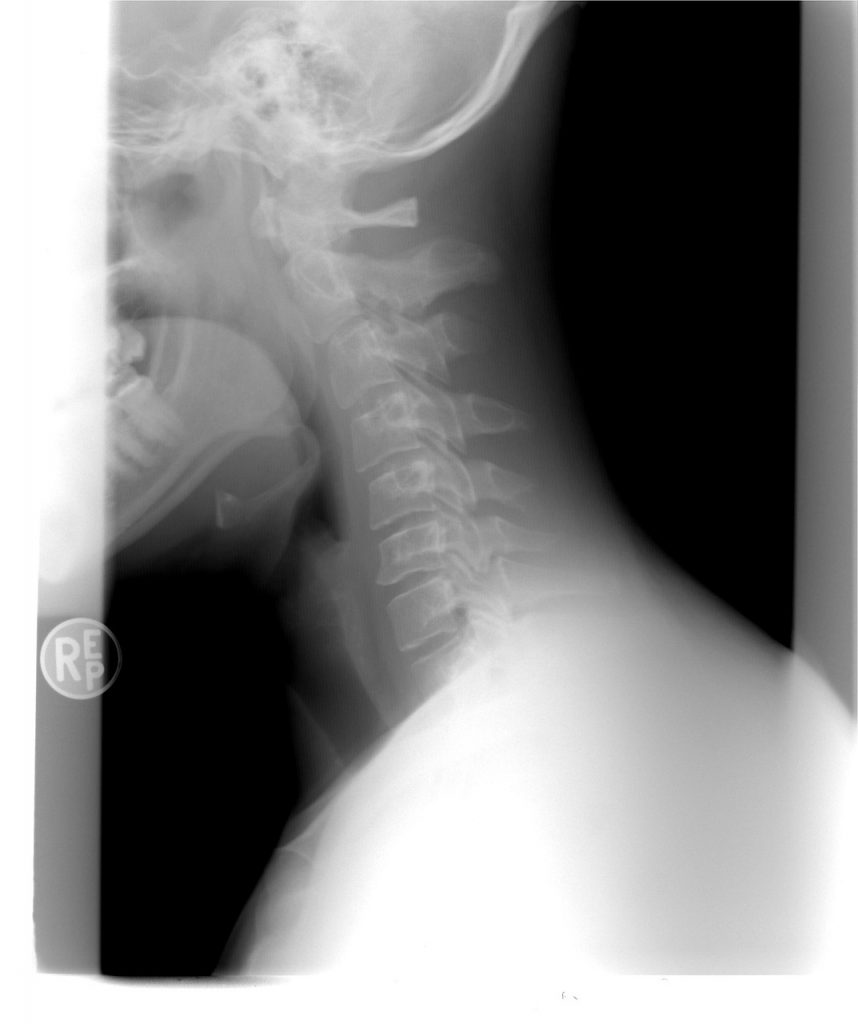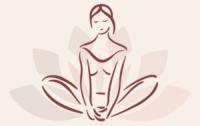If you have a thyroid disorder such as Hashimoto’s (detailed information about Hashimoto’s), you probably take a hormone replacement medication every day. But what else do you do for your well-being? Do you perhaps know of complaints that persist despite this? Are back problems an issue?
The thyroid gland plays a central role in the body by regulating metabolism and producing important hormones. Our hormonal and immune systems are complex systems and interact closely. It is therefore not surprising that the autoimmune disease can manifest itself through many symptoms. But did you also know that your thyroid gland and spine are closely connected and influence each other? In this post, I’ll focus on this connection.
Current scientific evidence shows how important it is to look at this connection holistically to promote health.
How the Thyroid Affects the Spine

There are studies that show that thyroid disorders such as Hashimoto’s not only affect the thyroid itself but can also affect the spine. A study published in the PubMed article ‘Association Between Hashimoto’s Thyroiditis and Degenerative Disc Disease’ (https://pubmed.ncbi.nlm.nih.gov/26885680/) found that people with Hashimoto’s antibodies had a higher incidence of degenerative disc disease. This means that people with thyroid problems like Hashimoto’s are more likely to have damaged discs between their vertebrae, which can cause pain and limited mobility.
The inflammation associated with Hashimoto’s and other autoimmune diseases can affect the vertebrae and cause small displacements of the vertebrae, which in turn can cause pain and nerve damage. Symptoms such as tingling, numbness and muscle weakness can occur.
All of these symptoms are ones that I often see in my clients with autoimmune disorders, or that they report to me.
The spinal column assignment in the PDF originates from chiropractic and is compiled from different sources.
How your spine affects the thyroid

Conversely, the spine can also affect the thyroid. For example, poor posture of the spine can affect the function of the thyroid. The cervical spine in particular – around the C7 vertebra – is crucial because a nerve directly between the shoulder blades is connected to the thyroid gland. If this area is overloaded due to poor posture or tension, symptoms such as hair loss, weight gain or fatigue can occur more frequently.
The question now is what you can do yourself to prevent, improve or stabilise symptoms. It is obvious that taking a replacement hormone alone is not the answer to alleviating all symptoms… It is worth actively working towards improvement through additional measures such as exercise and stress reduction.
Health tips: Here’s how you can support both your thyroid and your spine
According to the current state of medical knowledge, taking hormones alone is usually sufficient for treating Hashimoto’s. However, it is important that a holistic approach that includes the additional measures improves or can improve the overall result and promotes the health of the thyroid and spine. Based on the study results and best practices, the following measures promise a significant improvement:
- Pay attention to your posture: Pay attention to how you sit, especially if you work at a computer a lot. Poor posture, such as a forward-leaning head, can put strain on the spine and disrupt the function of the thyroid gland at the same time. This also applies to what is known as ‘cell phone neck’, where frequent looking down puts undue strain on the spine and the surrounding muscles. Try to take regular breaks, relax your shoulders and keep your head straight.
- Get regular exercise: Exercise is a real cure-all! Simple activities such as going for a walk, swimming or doing yoga strengthen the muscles and promote the mobility of the spine. They also help to support the hormonal balance of the thyroid gland and improve your well-being. If you have trouble with more intensive sports, joint pain or other complaints, personal training or coaching with a specialist can be useful, especially at the beginning.
- Reduce stress: Chronic stress can put a strain on the thyroid gland and promote inflammation, as well as cause tension in the spine. Find ways to reduce your stress – relaxation techniques such as meditation, breathing exercises, gentle yoga sequences or simply a relaxed conversation with friends help to cope with stress and stabilise hormonal balance. Reducing stress has a positive effect on both areas!
- Get professional help: If you experience symptoms such as pain, tingling or tiredness, it is important to seek medical advice. An interdisciplinary approach involving doctors, physiotherapists and alternative methods such as yoga therapists can be particularly effective.
Conclusion
One ailment rarely comes alone, or can lead to further ailments. The close connection between the thyroid and spine requires a holistic approach to prevention and support for well-being. Scientific findings, such as the study mentioned, prove that both should not be considered in isolation. With targeted measures such as posture correction and stress management, you can sustainably strengthen the health of your spine and thyroid. Good posture also supports breathing and digestion (or impairs them if your posture is poor), which in turn has a positive effect on health and well-being.
Health coaching and yoga therapy can also be particularly helpful because these therapy methods consider the person as a whole and treat them according to their individual needs, promoting health and supporting healing processes.
I look forward to your comments on this article and to a constructive exchange. In any case, self-diagnosis is not recommended.
Sources:
https://pubmed.ncbi.nlm.nih.gov/26885680
https://maxliving.com/healthy-articles/the-spines-role-in-thyroid-health/

I’m really inspired with your writing abilities as well as with the layout
to your blog. Is this a paid theme or did you modify it
your self? Either way keep up the excellent high quality writing,
it is rare to see a nice weblog like this one today. TikTok ManyChat!
Thank you for the feedback. Yes, it is a paid theme which is modified by myself.